In Part 1 of this exclusive, the La Cañada High School (LCHS) Wellness Center has willingly partnered with California's peer-to-peer counseling program, despite parental concerns and lack of transparency about its implementation. The state has plans to use the LCHS Wellness Center as a model for the implementation of wellness centers and peer-to-peer counseling in other schools. In June 2023, Glendale Unified School District fought its battle to keep this out of its district. Glendale is a small suburb in the San Fernando Valley and just southeast of La Crescenta, and La Cañada. The Glendale School Board wanted to go full steam ahead, despite evidence of student suicides, as my colleague Brittany Sheehan reported.
In a little more than a decade, Crescenta Valley High School, the school “piloting” the peer counseling program, has experienced two tragic incidents of student suicide. One of those heartbreaking deaths occurred publicly in front of peers when a student jumped from a three-story roof during lunchtime. The student’s parents, in turn, filed a $2 million lawsuit against the district, arguing GUSD had been negligent in protecting the child by intervening in bullying and harassment that their 15-year-old child was facing at school. The parents’ lawsuit was dismissed, and the district offered sentiments saying that it “sympathized with the family.”
A similar peer counseling program is offered in neighboring La Cañada Unified School District, in which a source familiar with the course tells RedState that students are required to sign a confidentiality agreement. They also revealed that parents in that district are not happy about the program, either, saying it has “major red flags” and raising questions of who is liable if a teenager breaches the contract. Parents with larger incomes are concerned that they are especially at risk of becoming targets of such lawsuits.
This Confidentiality Agreement is part of the bone of contention with dissenting parents who attended the September 26, 2023 Governing Board meeting. As stated in Part 1, the meeting was supposed to give an overview of the peer-to-peer program and highlight its successes, as well as address concerns. However, neither the LCUSD Board nor supportive parents were interested in hearing about their concerns and why taking this program to another level would not be wise. It was reported to RedState that the parents who attended the meeting for the sole reason to speak about their concerns over the program were treated with hostility and resentment. One parent said the anger "was palpable."
Attempts were made by RedState to reach out to other parents in the La Cañada community, but few wished to come forward. La Cañada is a small, tightly-knit community, and much like the school board madness in Manhattan Beach in 2021, anything that disrupts the illusion of peace and harmony is rejected outright. People do not like their apple carts disturbed, no matter how rotten the apples might be.
In that September 26 presentation, Rachel Zooi did address questions about why the language about the peer-to-peer program presented to students, and the language in fliers and literature about the Wellness Center, sometimes did not align. Zooi also had to respond to concerns and questions about boundaries, how these peer-to-peer meetings with students are documented, and the level of detail given by the student to the Wellness Center peer. Throughout the presentation, Zooi's responses lacked confidence, and her depth of knowledge was sorely lacking.
WATCH:
Our LCSW (licensed clinical social worker) Flora (not her real name) said:
The district insists that the peer support is limited to academics. But let’s be clear that there is a name for peer support that is strictly limited to academics – it’s called tutoring. And yet the game was revealed during minute (1:08:07) when Dr. Zooi acknowledged that the sessions can broach on any topic at all. "It's hard to say, you can't talk about this, or you can't talk about that," Zooi said. At minute 1:10, Zooi states that grief/loss, academic stress and "peer issues" are their top topics. So this encompasses basically anything. Your parents are getting a divorce? Your eating disorder is getting worse? Your boyfriend wants to have anal sex and you’re not sure? All things which could affect a student’s ability to focus on their math homework.
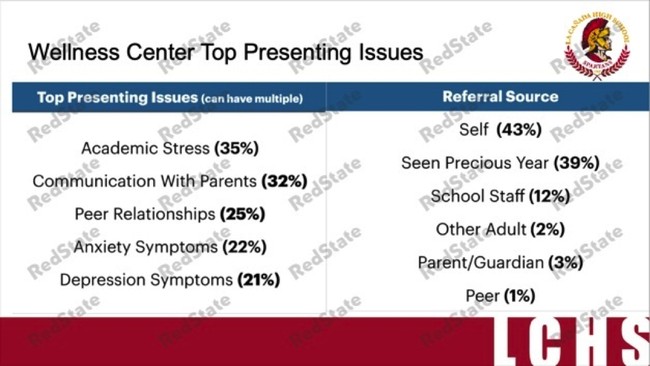
Then Dr. Zooi revealed that the student counselors bounce between the roles of peer counselor, teacher assistant, or trained intern, depending upon the need at that time. Exactly how does this help them learn about the counseling profession (even though it is said they do not do any "counseling") or increase their skill sets for future education and employment?
As stated above, the most contentious and disturbing portion of this peer-to-peer program is the required confidentiality, and the dangers of liability inherent in this. The LCSW Flora called it, "by far, the most dangerous deception of the program," and detailed why you should be alarmed, especially if you are a trained clinician.
Throughout the presentation, the Peer Support staff insisted, with their voice dripping in condescension, that they teach students boundaries, they discuss confidentiality, they develop trust. The Peer Support staff assured the school board that the students won’t gossip, because they promised not to.
Let’s ask a question – these kids are in school, right? Does everyone in every class get As? Or do some students do things wrong and fail some assignments, forget to turn things in, get a C-, or just do it to fluff up their college application? Do kids always do what they promised they would do? Do kids ever make mistakes?
What LCHS is requiring of these teenagers is to skate along the edges of what licensed professionals do, without any true safeguards. There is a reason medical and mental health professionals carry liability and malpractice insurance. Not to mention, these are minors, so legally they cannot be held liable; but if a student they are speaking with does not respond well and does something harmful or catastrophic as a result, who will help that student peer navigate the burden of guilt from their role in it? Who takes the blame for a student who could be damaged or commit suicide after their "counseling" and interactions with the Wellness Center?
LCUSD insists, No, these students attended a mandatory information session to understand what the Peer Support program is. They were interviewed. They were selected. They were clearly advised on the “scope of their training.” They received training on how to adhere to “strict confidentiality.” Are these people listening to themselves?
These administrators and teachers are talking about students as though they are employees, as though these students have some sort of legal responsibility or potential liability, and so they wouldn’t possibly disobey instructions. It’s like these teachers have never met a teenager. Fourteen-year-olds couldn’t possibly ever forget, lie, or deceive others for personal gain. Also, this should be fairly obvious but it appears that it needs repeating – students have no legal obligation to adhere to the confidentiality, boundaries and ethics that are required of adult professionals.
Mr. Wayne Page, a parent who offered opposing comment, also cogently pointed this out. Mr. Page had no issue with the academic aspect of this peer support model, but the fact that teenagers are performing the same form of practicums that only licensed professionals, and those formally training to be such, undergo. Mr. Page brought up the "First Do No Harm" dictum of medicine.
It is impossible to stop a student in need from divulging extremely private, personal information to a fellow student in the Wellness Center.
WATCH:
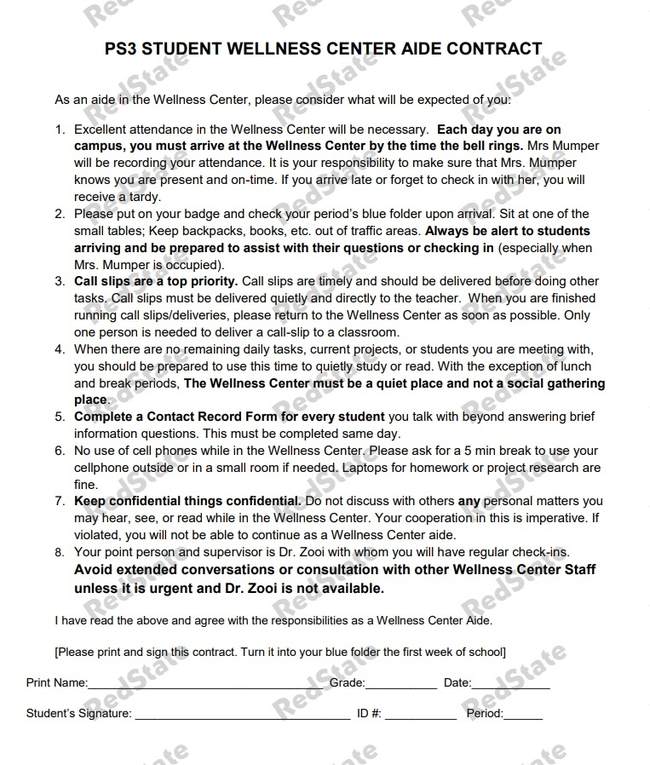
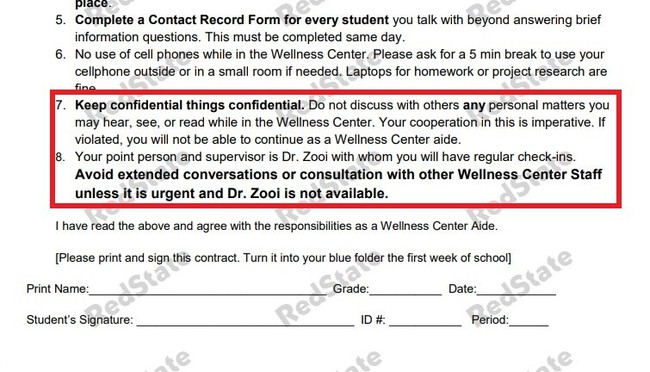
The attendees did hear from parents in favor of the program. One woman whose son was part of the peer support felt that they both benefited from it. Then a student peer counselor spoke enthusiastically about the program, and expressed her support for it. But the glaring problems cannot simply be ignored. After the glowing recommendations, another parent pointed out the lack of transparency and clarity in the marketing materials, and how it diverged from the information that gets presented to the students and parents. He also noted,
It's clear to me that there are issues, legitimate issues that have been raised. And that there is tremendous risk to the district and to the students who you are putting into this situation.
WATCH:
We interviewed another parent (who requested his name be withheld). This parent disclosed that his teenager confirmed that the required confidentiality form the peer counselors are required to sign, means little. His teenager informed him that it was an open secret among the student body that if they wanted their information revealed, they should go talk to a peer counselor at the Wellness Center. Another parent pointed out some disturbing aspects of the slide presentation. They also made the astute observation that the tactics and behaviors used to draw students into the Wellness Center are eerily similar to the ones used by child predators.
They set up tables outside the Wellness Center to lure kids in, handing out free breath mints or candy to the kids. One of the presentation slides shows some kind of raffle or signup contest with a smiling peer support student behind the table. The next one shows a table set up at another building promoting the Wellness Center, with one of the service dogs out to draw kids over to the table.
They brag about acquiring a third service dog for the Wellness Center.
The parent was also disturbed that they measured success in terms of the number of students they have seen and the tabulation of the types of issues they have addressed, rather than the actual number of students who have been helped.
The priorities are misplaced. They are measuring success by the number of kids attending, while ignoring the unintended consequences, and normalizing mental illness and suicidal ideation.
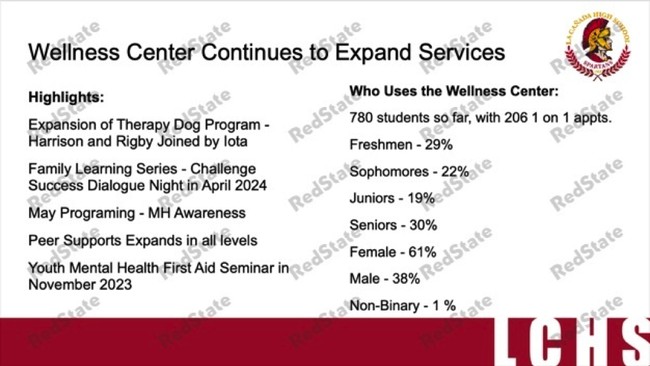
Among the motivational board messages around the Wellness Center is a card that says, "Change to Chill." LCSW Flora delved into the subtle agenda behind this message.
Parents might think the notion that these Wellness Centers are used to promote ideologies is far-fetched. But the presentation slides show an image of clichés posted around the school, promoting a specific website called ChangetoChill.org. A brief perusal of this website shows a radical ideology being taught around gender ideology, gender pronouns, critical race theory, intersectionality, systems of oppression, and more.

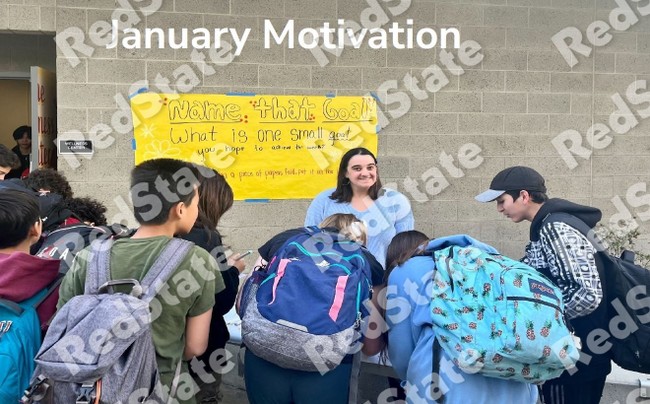
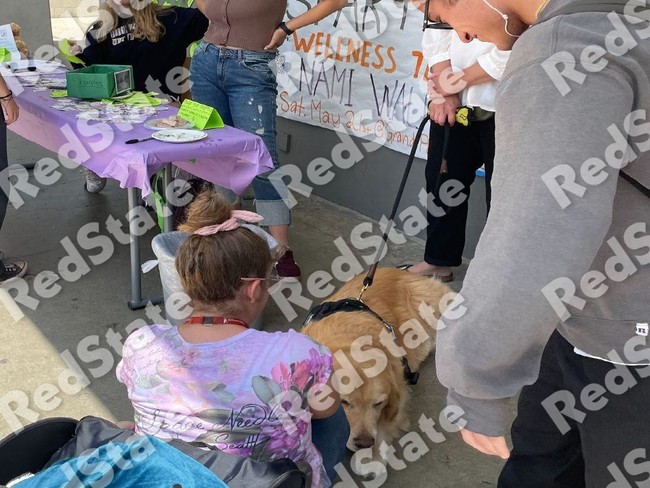
The Governing Board, the Wellness Center staff, and the supportive parents were displeased that the legitimacy of the program and its methodology was being questioned. However, getting students to focus on their mental health should not involve a carnival atmosphere, and its maintenance should not be some sideshow draw. A Wellness Center should not be the hippest place to congregate or where the kids wait in line to get in like it's a club. As one parent commented, teenagers who legitimately need help will stay away and not receive it, and others who simply want to mine information and gossip will make it their aim to hang out. How is this serving the mental health concerns of the student bodies of LCUSD? How is this a model of success that should be replicated?
LCSW Flora informed RedState that,
These concerns are not strictly local to La Cañada Unified. La Cañada Unified stated at the board meeting that they are meeting with other schools, and also a statewide agency to discuss how to utilize the La Cañada Peer Support program as a model framework in other schools.
As explained in Part 1 of this exclusive, California works tirelessly to erode the familial bond between parent and child. So, these programs may appear to be well-intentioned helpers and an assist to help your child navigate better academically and socially, but the end result is to uproot their value system and sense of security, and replace it with their own agenda. LCSW Flora left with this final observation about the presentation.
Finally, we get to the most important topic that seems to fly over parents’ heads, but which needs to be highlighted: This program devalues the parent-child relationship.
In the presentation, English Teacher Lucy Pelletier is explaining the Peer Support 1 syllabus, and she discusses that the first topic students discuss in peer counseling is the topic of trust. Pelletier refers to it as, "the most important and foundational value of the program."
What is lost by many parents, is that this is about degrading the trust they have with you. The course is about keeping secrets, and learning which secrets to keep, especially from parents. So, right around the time that your teenager is starting to pull away from parents and individuate developmentally, the school has created an environment where they are only allowed to talk about certain topics with teachers and a specific set of students at school, and parents don’t get to be in the know. The content of the student’s conversation with the student they counsel once a week for two years is not privy to disclose.
However you slice it, the parent's ability to lead and direct the well-being of their teenager is being targeted, compromised, and chipped away with each state program that seeks to replace their role and influence in their child's life.
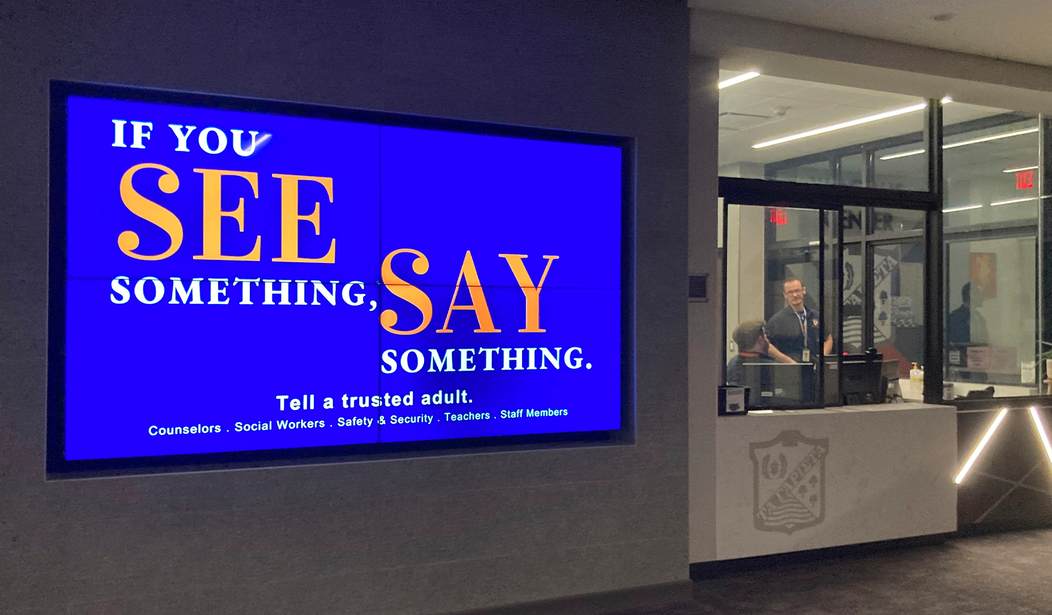













Join the conversation as a VIP Member